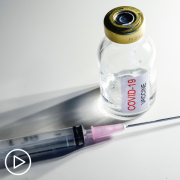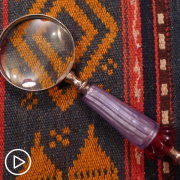Managing AML Symptoms
Dr. Daniel Pollyea discusses the management of acute myeloid leukemia (AML) symptoms, stressing the need for swift implementation of a treatment plan and providing advice on supplement use.
Dr. Daniel Pollyea is Clinical Director of Leukemia Services in the Division of Medical Oncology, Hematologic Malignancies and Blood and Marrow Transplant at University of Colorado Cancer Center. More about this expert.
Related Resources

|
Transcript:
Ross:
What are the best ways to manage those symptoms?
Dr. Pollyea:
Right. So, I mean, at presentation, all those symptoms, the best way to manage those are to start treatment as quickly as possible. So, impacting the underlying cause of this disease is the most important and critical factor to getting a person feeling better because all of these problems stem from the disease in the bone marrow, and so everything else that you do to sort of help a person’s symptoms are Band-Aids when you’re not talking about getting to the root cause.
So, that’s at presentation. Now once we start treatment, there are many potential side effects to any number of treatments. And it all is dependent on what treatment you’re getting and other things about you that will make this a significant problem in some cases. And in that setting, we do have ways that we can aggressively manage a person’s
side effects.
Ross:
Can you manage all of the symptoms? Or can people still be experiencing symptoms even after they’re in treatment?
Dr. Pollyea:
Absolutely. So, a person with this disease, depending on how long they’ve had it and some of the features, may not be feeling back to their baseline self for potentially weeks or months after treatment starts in the best-case scenario. So, that can be very frustrating, but a person needs to sort of be able to continue to have a good outlook and stay positive. Because we are able in many cases to make a big impact on this disease and return a person to their pre-disease quality of life.
Ross:
There are some patients who I understand think that supplements can deal with the symptoms of AML. Is that accurate?
Dr. Pollyea:
You know, I mean, I think the supplement question is always a challenge. A lot of these supplements, or most of these supplements have never been tested with the rigor of treatments that we’re accustomed to in the medical establishment. That being said, I won’t deny that some of the supplements can help patients based on what patients’ experiences are and what they tell me. I think what’s really important is just be very open and honest with your doctor about the supplements that you’re taking or want to take to ensure that there are no sort of unanticipated interactions with treatments.
Because I think most doctors are very open to having their patients care for themselves in the ways that they’ve become accustomed to, and they know their bodies very well, and we’re very open to that. But there are sometimes that a drug or a supplement might have a bad interaction with the treatment.
And so, a good example in my practice is antioxidants. So, there’s a lot of literature, a lot of interest in antioxidants as cancer-prevention treatment. And a lot of that is not well-established, but still I don’t see much harm. But when it comes time to treating a cancer, that’s a very different situation. When we give a patient treatment to try to kill the cancer cells, many times we’re trying to provoke oxidation. That’s part of how these drugs and these treatments work.
So, if you’re taking those treatments, but also at the same time taking antioxidants, there’s the potential you could sort of be cutting your therapy off at the knees, fighting it with one hand behind your back. So, for the period of time when my patients are getting an active treatment, I ask that they don’t take it antioxidant. And they can resume that in the future in the hopes of preventing another cancer. But the time to prevent with an antioxidant isn’t appropriate when you’re dealing with an active cancer. So, that’s just one example.












